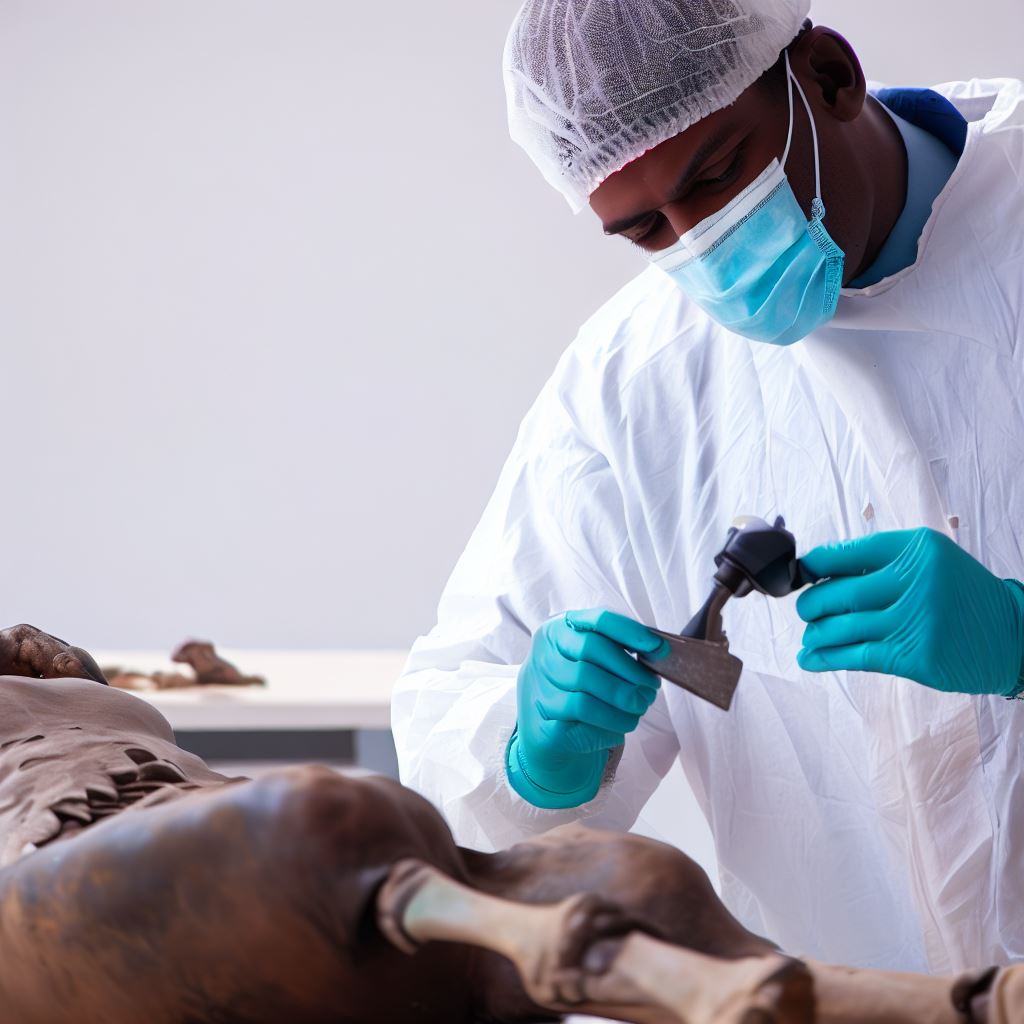Introduction
Forensic pathology is the field that investigates the causes of death through autopsies and medical examinations.
Forensic pathologists play a critical role in criminal investigations by providing crucial evidence to help solve crimes.
The purpose of this blog post is to provide a comprehensive guide for aspiring forensic pathologists in Nigeria.
From education and training requirements to job opportunities and challenges, this chapter aims to equip readers with all the necessary information to pursue a career in this fascinating field.
Understanding Forensic Pathology
Forensic pathology is the branch of medicine that focuses on determining the cause of death in a legal context.
Forensic pathologists play a crucial role in the investigation of crime, accidents, and unexplained deaths.
The main responsibility of a forensic pathologist is to conduct autopsies and perform post-mortem examinations on deceased individuals.
By carefully examining the body, they gather important evidence to determine the cause and manner of death.
Forensic pathologists utilize various scientific techniques and methods to aid in their investigations.
These include the analysis of body tissues, fluids, and organs using laboratory tests and sophisticated equipment.
One of the commonly used techniques in forensic pathology is toxicology, where the pathologist analyzes bodily fluids and tissues for the presence of drugs, alcohol, or other toxic substances.
This helps determine if the deceased had ingested any substances that could have contributed to their death.
Another important method is histopathology, which involves examining tissue samples under a microscope to identify any abnormal cells or disease processes.
This assists in establishing if a medical condition or illness played a role in the person’s demise.
Forensic pathologists also rely on radiology, using X-rays and CT scans to detect fractures, internal injuries, or foreign objects that may have caused or contributed to the death.
Additionally, forensic odontology helps identify human remains using dental records or analyzing bite marks.
Educational Requirements
When it comes to pursuing a career as a forensic pathologist in Nigeria, there are specific educational qualifications that one must meet.
These requirements ensure that individuals have the necessary knowledge and skills to perform the job effectively and responsibly.
Undergraduate and Medical School Requirements
- Completion of a Bachelor’s Degree: Prospective forensic pathologists must first obtain a Bachelor’s degree in a relevant field such as biology, chemistry, or forensic science.
- Medical School: After completing their undergraduate studies, aspiring forensic pathologists need to attend medical school. This typically takes four to six years.
- Obtain a Medical License: Once medical school is completed, graduates must pass the Nigerian Medical and Dental Council (NMDC) examination and obtain a medical license to practice in the country.
Importance of Completing a Residency Program in Anatomic Pathology
After obtaining a medical license, aspiring forensic pathologists must complete a residency program in anatomic pathology to gain practical experience and specialized training in the field.
The residency program typically lasts for four years.
During the residency program, individuals work under the guidance of experienced pathologists and gain exposure to various aspects of the profession.
This includes conducting autopsies, analyzing tissue samples, and interpreting laboratory results.
Completing a residency program in anatomic pathology is crucial as it provides the foundation for further specialization in forensic pathology.
Additional Training in Forensic Pathology through a Fellowship Program
While a residency program in anatomic pathology equips individuals with fundamental skills, it is also necessary to undergo additional training in forensic pathology through a fellowship program.
A fellowship program in forensic pathology focuses specifically on the forensic aspects of pathology.
During this period, individuals delve deeper into the investigation of crimes, cause of death determinations, and courtroom testimony.
To become certified as a forensic pathologist in Nigeria, individuals must complete a two-year forensic pathology fellowship program accredited by the National Postgraduate Medical College (NPMC) or the West African College of Physicians (WACP).
This fellowship program provides hands-on training in forensic autopsy techniques, forensic toxicology, forensic anthropology, and other relevant forensic disciplines.
It also emphasizes the importance of maintaining the integrity of evidence, proper documentation, and effective communication skills when working with law enforcement agencies and the legal system.
Read: The Intersection of Technology and Food Science in Nigeria
Licensing and Certifications
In order to practice forensic pathology in Nigeria, individuals must go through a specific licensing and certification process.
This ensures that they have the necessary skills and qualifications to perform their duties effectively and responsibly.
Obtaining a License
- Complete a medical degree program from a recognized medical school in Nigeria.
- Undergo a one-year internship at a reputable hospital or medical institution.
- Apply for a license from the Medical and Dental Council of Nigeria (MDCN).
- Pass the MDCN licensing examination, which tests knowledge and competency in forensic pathology.
- Pay the necessary fees and submit all required documents to obtain the license.
Importance of Board Certification
Board certification in forensic pathology is crucial for professionals aiming to establish themselves in the field.
It demonstrates their commitment to excellence and verifies their expertise.
Examinations and Requirements for Certification
- Complete a residency program in anatomical pathology, followed by a specialized forensic pathology fellowship.
- Appear for the West African College of Surgeons (WACS) or the National Postgraduate Medical College of Nigeria (NPMCN) examination.
- Pass the examination, which covers various aspects of forensic pathology.
- Submit relevant case reports and undergo an evaluation process by a credentialing board.
- Meet the requirement for a specific number of autopsies conducted under supervision.
Maintaining Continuing Education and Staying Updated
Continuing education is vital for forensic pathologists to stay updated with the latest advancements and practices in the field.
- Participate in conferences, seminars, and workshops related to forensic pathology.
- Engage in research and contribute to scientific journals to enhance professional knowledge.
- Attend regular training programs organized by professional bodies and institutions.
- Join forensic pathology associations to network with peers and exchange information.
- Keep abreast of changes in laws, regulations, and forensic techniques through continuous learning.
By maintaining continuing education and staying updated, forensic pathologists can ensure that they provide accurate and reliable analysis, contributing to the pursuit of justice in Nigeria.
Read: Nigerian Food Regulations: A Food Scientist’s Perspective
Building Experience
In order to become a successful forensic pathologist in Nigeria, gaining practical experience in the field is of utmost importance.
Here, we will discuss the various avenues through which one can build valuable experience:
Internships
- Participating in internships allows aspiring forensic pathologists to gain hands-on experience in real-life forensic investigations.
- Internships provide opportunities to work under experienced professionals and learn from their expertise.
- These practical experiences help individuals understand the intricacies of the field and develop essential skills.
Clinical Rotations
- Engaging in clinical rotations is crucial for acquiring experience in different medical settings.
- During clinical rotations, aspiring forensic pathologists can observe autopsies and other forensic procedures.
- They can develop crucial skills in evidence collection, analysis, and interpretation.
Apprenticeships
- Participating in apprenticeships allows individuals to work directly with experienced forensic pathologists.
- Under the guidance of mentors, apprentices gain practical experience and improve their skills.
- Apprenticeships provide the opportunity to learn about handling complex cases and working in multidisciplinary teams.
Professional Organizations and Conferences
- Joining professional organizations such as the Nigerian Association of Forensic Pathologists is highly beneficial.
- Being a member of such organizations grants access to valuable resources, networking opportunities, and ongoing education.
- Attending conferences and seminars allows forensic pathologists to stay updated with the latest advancements in the field.
- These gatherings also provide opportunities to connect with experts and exchange knowledge and experiences.
Building experience is essential for anyone aspiring to become a forensic pathologist in Nigeria.
Internships, clinical rotations, and apprenticeships offer practical exposure to the field and allow individuals to acquire important skills and knowledge.
Additionally, joining professional organizations and attending conferences contribute to continuous learning and networking, enhancing professional growth.
Through these avenues, aspiring forensic pathologists can lay a strong foundation for a successful career in this specialized field.
Read: Success Stories: Leading Food Scientists in Nigeria

See Related Content: Libraries in Nigeria: Librarian’s Role and Influence
Job Opportunities and Career Path
Different career options available for forensic pathologists in Nigeria
When it comes to job opportunities, forensic pathologists in Nigeria have a range of career options to choose from.
- Medical Examiner or Coroner: Forensic pathologists can work as medical examiners or coroners in government agencies or private organizations. They play a crucial role in determining the cause of death in cases involving criminal activities, accidents, or suspicious circumstances.
- Law Enforcement Agencies: Forensic pathologists are highly sought after by law enforcement agencies such as the Nigerian Police Force. They assist in criminal investigations by conducting autopsies, analyzing evidence, and providing expert testimony in court.
- Forensic Laboratories: Forensic pathologists can work in forensic laboratories where they analyze and interpret medical and scientific evidence related to crimes. They collaborate with other forensic experts to provide comprehensive reports and aid in criminal investigations.
- Academia and Research: Many experienced forensic pathologists choose to pursue careers in academia and research. They teach and mentor aspiring pathologists, contribute to scientific advancements, and publish research papers in reputed journals.
- Consultancy: Forensic pathologists also have the option to work as consultants for law firms, insurance companies, or other private sector organizations. They offer expert opinions and advice on medicolegal matters and provide valuable insights during legal proceedings.
Role of forensic pathologists in law enforcement, government agencies, and private sector
In addition to the various career options, forensic pathologists play a vital role in law enforcement, government agencies, and the private sector.
- Law Enforcement Support: Forensic pathologists provide crucial support to law enforcement agencies by conducting autopsies and determining the cause of death. Their findings often serve as key evidence in criminal investigations and legal proceedings.
- Criminal Investigations: By examining and analyzing the remains of deceased individuals, forensic pathologists help uncover vital clues and evidence that can lead to identifying suspects or determining the circumstances surrounding a crime.
- Identifying Public Health Risks: In cases involving mass casualties or disease outbreaks, forensic pathologists assist in identifying potential public health risks. They play a vital role in understanding patterns of diseases, contributing to preventive measures and public safety.
- Public Policy Guidance: Forensic pathologists provide expert advice to government agencies in matters related to public health, safety regulations, and forensic science. Their inputs help shape policies and procedures to ensure effective law enforcement and justice systems.
Potential for advancement and specialization within the field
Within the field of forensic pathology, there is ample potential for advancement and specialization.
- Forensic Neuropathology: Specializing in examining the brains and nervous systems of deceased individuals to determine the cause of death or identify neurological disorders.
- Forensic Odontology: Focusing on dental remains and dental records to aid in identification processes, bite mark analysis, and dental evidence evaluation.
- Forensic Toxicology: Specializing in analyzing body fluids and tissues to detect and identify toxins, drugs, or chemicals that may have contributed to a person’s death or played a role in criminal activities.
- Forensic Anthropology: Concentrating on identifying and examining skeletal remains to determine age, sex, ethnicity, and potential causes of death.
Pursuing a career as a forensic pathologist in Nigeria offers numerous job opportunities and a chance to contribute significantly to law enforcement, government agencies, and the private sector.
With options for specialization and advancement, it is a field that offers both challenges and rewards.
Read: A Career in Food Science: Qualifications Needed in Nigeria
Challenges and Rewards
Forensic pathology is not without its significant challenges in Nigeria. Forensic pathologists face numerous obstacles in their pursuit of justice and public safety.
In this section, we will explore the difficulties encountered by these professionals in their daily work, as well as the emotional toll it takes.
However, it’s important to also acknowledge the rewarding aspects of this noble profession.
Examination of the Challenges Faced by Forensic Pathologists in Nigeria
- Limited Resources: Forensic pathologists in Nigeria often struggle with inadequate facilities, equipment, and funding.
- Backlog of Cases: High case volume and lack of manpower contribute to a significant backlog of cases.
- Limited Specialization: The field of forensic pathology is relatively new in Nigeria, resulting in a scarcity of specialized professionals.
- Judicial System Challenges: Inefficient legal processes and lack of cooperation from other stakeholders can hinder forensic investigations.
- Crime Scene Accessibility: Gaining access to crime scenes can be challenging due to various factors, including remote locations and security concerns.
The Emotional Toll and the Need for Resilience in the Field
Working as a forensic pathologist in Nigeria can be emotionally draining.
The nature of the work, dealing with violent deaths and gruesome scenes, takes a toll on the mental well-being of these professionals.
They witness the dark side of humanity on a regular basis, leading to compassion fatigue, burnout, and other psychological challenges.
Resilience is crucial for forensic pathologists to cope with the emotional demands of the job.
Regular counseling, support from colleagues, and self-care practices are essential to maintain mental stability and continue serving the community.
The Rewarding Aspects of the Profession
Despite the challenges, being a forensic pathologist in Nigeria comes with its own set of rewarding experiences.
- Contributing to Justice: Forensic pathologists play a crucial role in helping to bring criminals to justice by providing expert testimony in court.
- Serving Public Safety: Their work directly contributes to ensuring public safety by uncovering the truth behind suspicious deaths.
- Impact on Families: Providing closure and answers to grieving families helps them find solace and move forward.
- Pushing Boundaries: Forensic pathologists in Nigeria are at the forefront of advancing the field in the country and pushing for improvements.
- Sense of Fulfillment: The knowledge that their work has a meaningful impact on society brings a deep sense of fulfillment.
Despite the challenges faced by forensic pathologists in Nigeria, the rewarding aspects of the profession make it an honorable and worthwhile calling.
These dedicated professionals continue to work tirelessly to seek justice, uphold public safety, and bring closure to grieving families.
Conclusion
This blog post has provided a complete guide for becoming a forensic pathologist in Nigeria.
We discussed the education and training requirements, skills needed, job responsibilities, and career prospects in this field.
It is an exciting and challenging profession that offers opportunities for scientific investigation and contribution to the justice system.
For aspiring forensic pathologists, it is crucial to have a passion for science, attention to detail, and an ethical mindset.
Pursuing a degree in medicine and specializing in forensic pathology is the first step towards achieving this career.
Continuous learning, practical experience, and staying updated with the latest research and techniques are vital for professional growth.
By becoming a forensic pathologist, you play a crucial role in society, upholding justice, and bringing closure to families of victims.
The field offers a chance to contribute to both the medical and legal systems, ensuring truth and establishing facts in criminal investigations.
If you are interested in learning more about forensic pathology in Nigeria, there are several resources and references available.
Books like “Introduction to Forensic Pathology” by Richard Shepherd and “Forensic Pathology: Principles and Practice” by David Dolinak provide in-depth knowledge on the subject.
Additionally, attending conferences, workshops, and reaching out to professionals in the field can provide valuable insights and networking opportunities.
Pursuing a career as a forensic pathologist in Nigeria is an admirable choice.
With determination, hard work, and continuous learning, aspiring professionals can make a significant impact in this field and contribute to the development of forensic science in the country.




